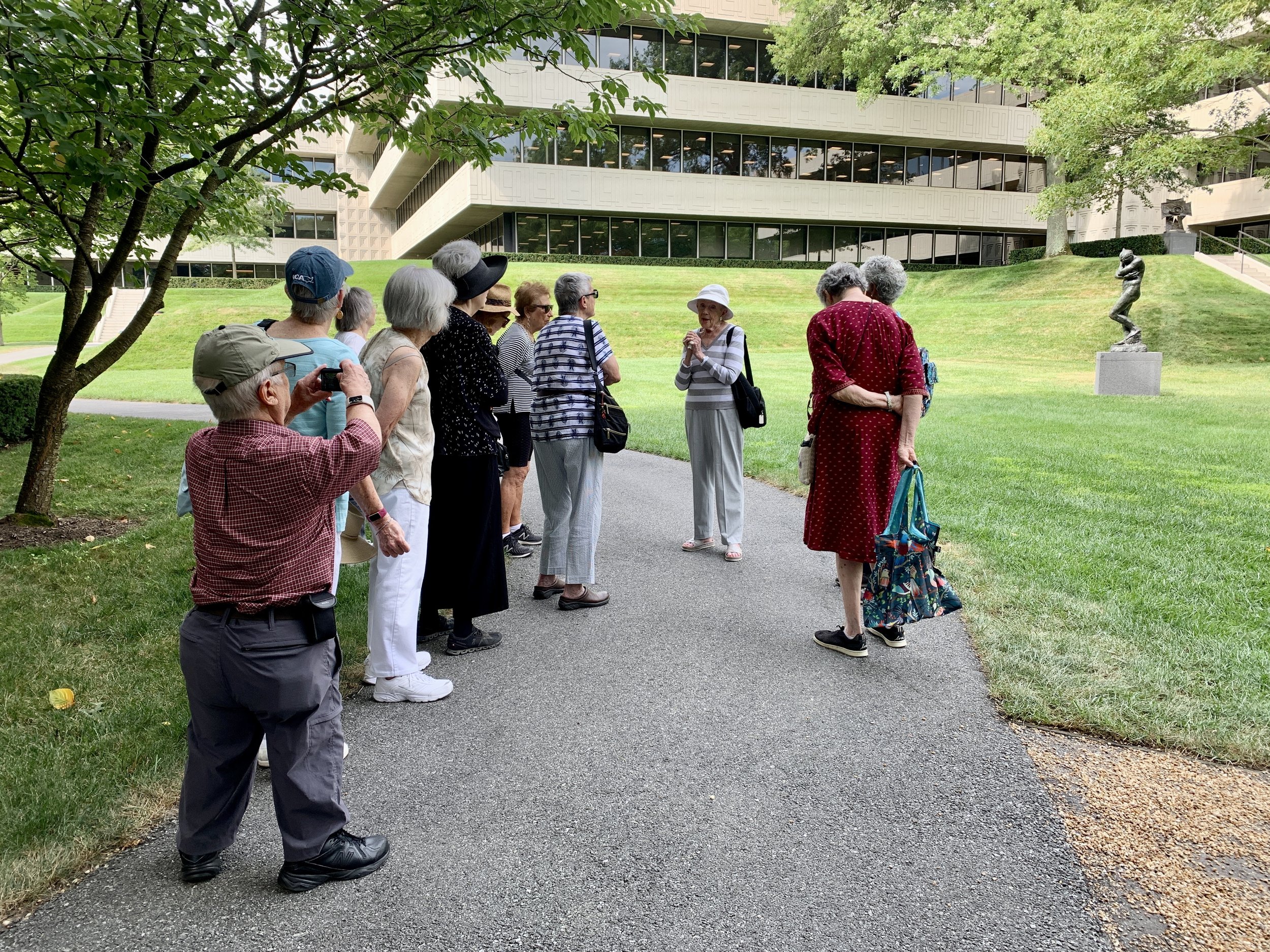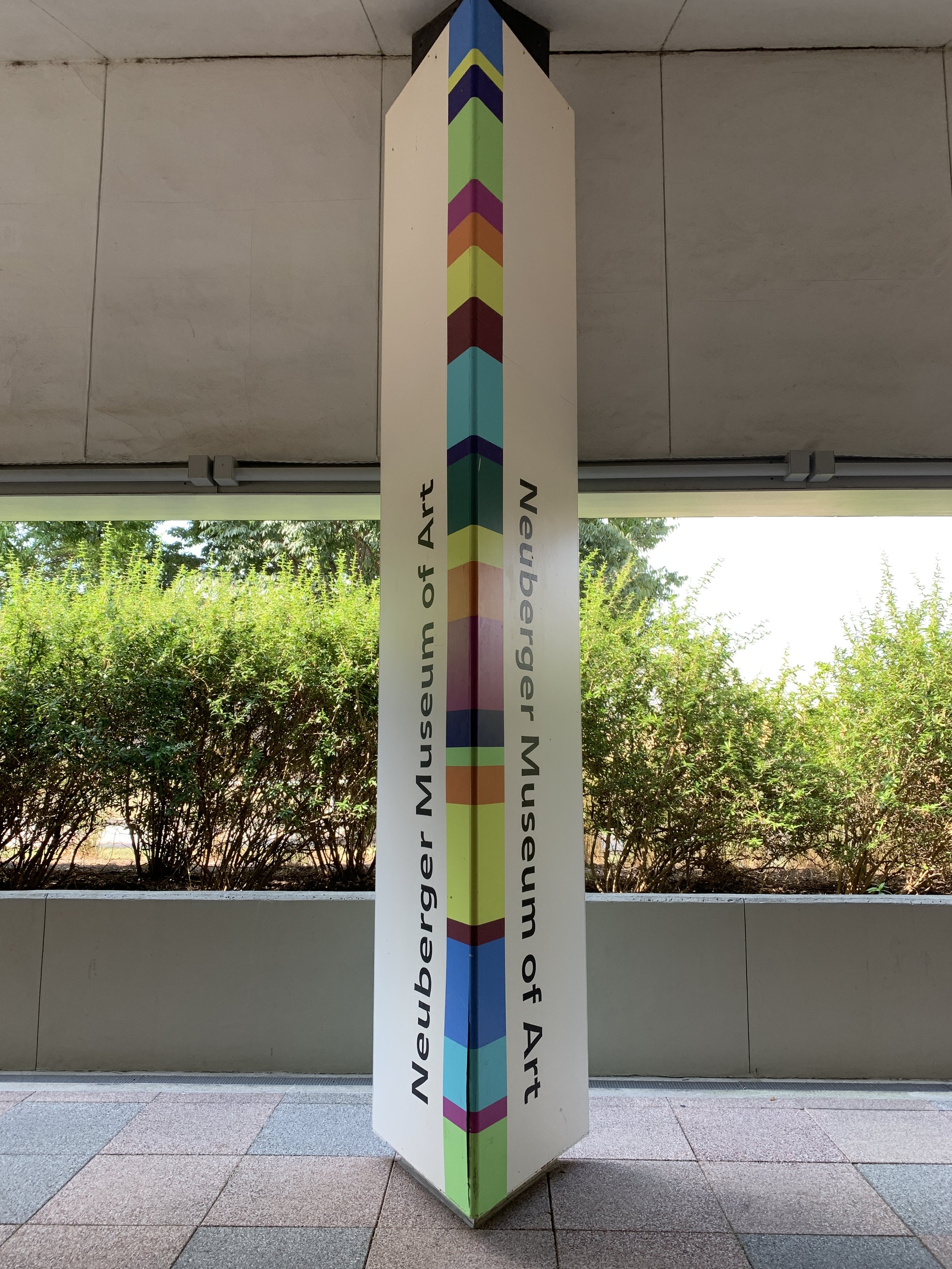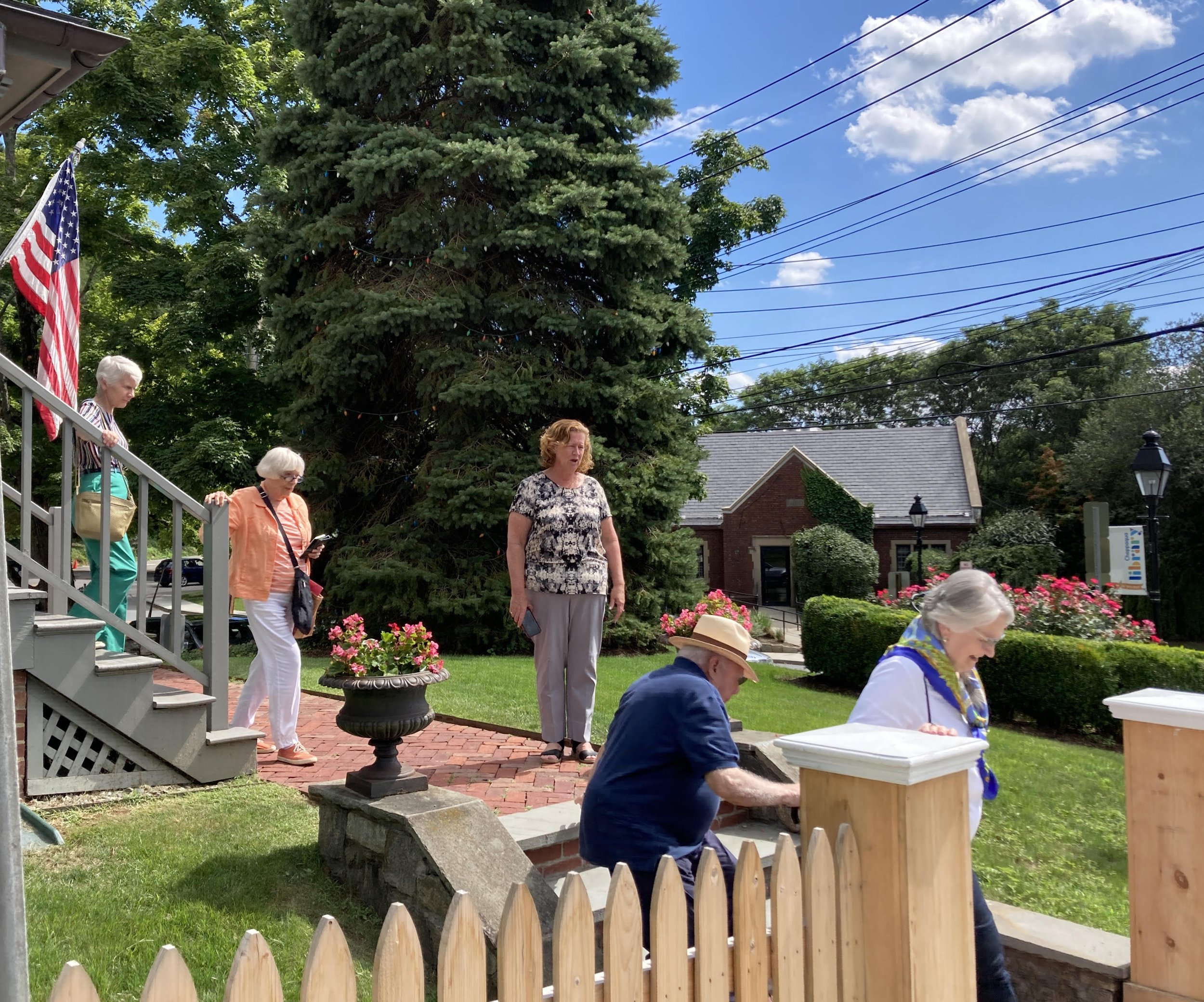Art and Photo by Sheila Benedis
Harry Bloomfeld Photos of KoH Trip to Pepsico Sculpture Garden
Photos by Harry BloomFeld
Art by Hart: With music thumping, the Chapin kids danced until they dropped.
Art and photo by Jane Hart
Photos from the Neuberger Museum Trip
All photos by Harry Bloomfeld
Some Humor from Simone
Thanks to Simone Thornberg for sending these.
From George O. Thompson via Jane Hart
We older people need to learn something new every day... just to keep the grey matter tuned up.
Where did "Piss Poor" come from?
Interesting History.
They used to use urine to tan animal skins, so families used to all pee in a pot. And then once it was full it was taken and sold to the tannery... if you had to do this to survive you were "Piss Poor".
But worse than that were the really poor folk who couldn't even afford to buy a pot... They "didn't have a pot to piss in" and were the lowest of the low.
The next time you are washing your hands and complain because the water temperature isn't just how you like it, think about how things used to be.
Here are some facts about the 1500's:
Most people got married in June because they took their yearly bath in May, And they still smelled pretty good by June. However, since they were starting to smell, brides carried a bouquet of flowers to hide the body odor. Hence the custom today of carrying a bouquet when getting married.
Baths consisted of a big tub filled with hot water. The man of the house had the privilege of the nice clean water, then all the other sons and men, then the women and finally the children. Last of all the babies. By then the water was so dirty you could actually lose someone in it. Hence the saying, "Don't throw the baby out with the Bath water!"
Houses had thatched roofs— thick straw—piled high, with no wood underneath. It was the only place for animals to get warm, so all the cats and other small animals (mice, bugs) lived in the roof. When it rained it became slippery and sometimes the animals would slip and fall off the roof. Hence the saying, "It's raining cats and dogs."
There was nothing to stop things from falling into the house. This posed a real problem in the bedroom where bugs and other droppings could mess up your nice clean bed. Hence, a bed with big posts and a sheet hung over the top afforded some protection. That's how canopy beds came into existence.
The floor was dirt. Only the wealthy had something other than dirt. Hence the saying, "Dirt poor." The wealthy had slate floors that would get slippery in the winter when wet, so they spread thresh (straw) on the floor to help keep their footing. As the winter wore on, they added more thresh until, when you opened the door, it would all start slipping outside. A piece of wood was placed in the entrance-way. Hence: a thresh hold.
(Getting quite an education, aren't you?)
In those old days, they cooked in the kitchen with a big kettle that always hung over the fire. Every day they lit the fire and added things to the pot. They ate mostly vegetables and did not get much meat. They would eat the stew for dinner, leaving leftovers in the pot to get cold overnight and then start over the next day. Sometimes stew had food in it that had been there for quite a while. Hence the rhyme:
“Peas porridge hot, peas porridge cold, peas porridge in the pot nine days old.”
Sometimes they could obtain pork, which made them feel quite special. When visitors came over, they would hang up their bacon to show off. It was a sign of wealth that a man could, "bring home the bacon." They would cut off a little to share with guests and would all sit around and chew the fat.
Those with money had plates made of pewter. Food with high acid content caused some of the lead to leach onto the food, causing lead poisoning death. This happened most often with tomatoes, so for the next 400 years or so, tomatoes were considered poisonous.
Bread was divided according to status. Workers got the burnt bottom of the loaf, the family got the middle, and guests got the top, or the upper crust.
Lead cups were used to drink ale or whisky. The combination would sometimes knock the imbibers out for a couple of days. Someone walking along the road would take them for dead and prepare them for burial. They were laid out on the kitchen table for a couple of days and the family would gather around and eat and drink and wait and see if they would wake up. Hence the custom of holding a wake.
England is old and small and the local folks started running out of places to bury people. So they would dig up coffins and would take the bones to a bone-house, and reuse the grave. When reopening these coffins, 1 out of 25 coffins were found to have scratch marks on the inside and they realized they had been burying people alive. So they would tie a string on the wrist of the corpse, lead it through the coffin and up through the ground and tie it to a bell. Someone would have to sit out in the graveyard all night (the graveyard shift) to listen for the bell; thus, someone could be “saved by the bell” or was considered a “dead ringer”.
And that's the truth.
Now, whoever said History was boring!!!
So get out there and educate someone!
Share these facts with a friend.
Inside every older person is a younger person wondering, 'What the heck happened?'
We'll be friends until we are old and senile.
Then we'll be new friends.
Smile, it gives your face something to do!
Moon Over Mary Powell
Photo by Arthur Brady
Art by Hart: Gary felt that the kids could use new fidget toys
Art and photo by Jane Hart
Art by Sheila Benedis: Time Warp Tunnel Book
Art and photo by Sheila Benedis
"A Circus Act Outside My Window"
Photo by Simone Thornber
Photos from Ithaca, NY from Arthur Brady
Cayuga Lake from Art Museum
Dry Waterfall
In Corning Glass Museum
Lynn by Cayuga Lake
Owl in Cornell Ornithology Museum
Gorge on Cornell Campus
For those who read French: Amusons nous avec notre belle langue
> > > > Cette dictée est incroyable mais vraie. Ne manquez pas de la lire, c'est surprenant. On dira après que le français n'est pas compliqué ! Ce petit texte, que je vous laisse savourer est une dictée trouvée dans un vieil almanach :
> > > > "Monsieur Lamère a épousé Mademoiselle Lepère. De ce mariage, est né un fils aux yeux pers*. (*pers = entre vert et bleu). Monsieur est le père, Madame est la mère. Les deux font la paire. Le père, quoique père, est resté Lamère, mais la mère, avant d'être Lamère était Lepère.
> > > > Le père est donc le père sans être Lepère, puisqu'il est Lamère et la mère est Lamère, bien que née Lepère. Aucun des deux n'est maire. N'étant ni le maire ni la mère, le père ne commet donc pas d'impair en signant Lamère.
> > > > Le fils aux yeux pers de Lepère deviendra maire. Il sera le maire Lamère, aux yeux pers, fils de Monsieur Lamère, son père, et de Mademoiselle Lepère, sa mère.
> > > > La mère du maire meurt et Lamère, père du maire, la perd. Aux obsèques, le père de la mère du maire, le grand-père Lepère, vient du bord de mer et marche de pair avec le maire Lamère, son petit-fils. Les amis du maire, venus pour la mère, cherchent les Lamère, ne trouvent que le maire et Lepère, père de la mère du maire, venu de la mer, et chacun s'y perd !"
Excellent pour l'exercice de mémoire et vos méninges !
> > > > Dommage que beaucoup de ces verbes soient tombés dans l’oubli.
> > > > Le chien aboie quand le cheval hennit et que beugle le bœuf et meugle la vache.
> > > > L'hirondelle gazouille, la colombe roucoule et le pinson ramage.
> > > > Les moineaux piaillent, le faisan et l'oie criaillent quand le dindon glousse.
> > > > La grenouille coasse mais le corbeau croasse et la pie jacasse.
> > > > Et le chat comme le tigre miaule, l'éléphant barrit, l'âne braie, mais le cerf rait.
> > > > Le mouton bêle évidemment et bourdonne l'abeille.
> > > > La biche brame quand le loup hurle.
> > > > Tu sais, bien sûr, tous ces cris-là mais sais-tu ?...
> > > > Que si le canard nasille, les canards nasillardent,
> > > > Que le bouc ou la chèvre chevrote,
> > > > Que le hibou hulule mais que la chouette, elle, chuinte,
> > > > Que le paon braille, que l'aigle trompète.
> > > > Sais-tu ?
> > > > Que si la tourterelle roucoule, le ramier caracoule et que la bécasse croule, que la perdrix cacabe, que la cigogne craquette et que si le corbeau croasse, la corneille corbine et que le lapin glapit quand le lièvre vagit. du verbe vaginer
> > > > Tu sais tout cela ? Bien.
> > > > Mais sais-tu ?
> > > > Que l'alouette grisolle ?
> > > > Tu ne le savais pas. Et, peut-être, ne sais-tu pas davantage que le pivert picasse. C'est excusable !
> > > > Ou que le sanglier grommelle, que le chameau blatère
> > > > Et que c'est à cause du chameau que l'on déblatère !
> > > > Tu ne sais pas non plus peut-être que la huppe pupule
> > > > Et je ne sais pas non plus si on l'appelle en Limousin la pépue parce qu'elle pupule ou parce qu'elle fait son nid avec de la chose qui pue. Qu'importe !
> > > > Mais c'est joli : la huppe pupule !
> > > > Et encore sais-tu que la souris, la petite souris grise : devine ? La petite souris grise chicote ! Avoue qu'il serait dommage d'ignorer que la souris chicote et plus dommage encore de ne pas savoir, que le geai cajole !"
> > > > Et que l’homme picole !
From Simone Thornber
Kendal Sunflower Blooming
Photo by Arthur Brady
The flower was grown on the Kendal Terrace by Peter S.
Art by Hart: Cassie wondered why people were hitting her piñata
Art and photo by Jane Hart
"Cascading Feelings" by Sheila Benedis
Art and photo by Sheila Benedis
KoH Trip to Horace Greeley's House (1800s) in Chappaqua
Photos by Marianne Bloomfeld
A New Sunset Photo
Photo by Joe Bruno
What Happened When One Senior Tried to Understand Facebook
Thanks to Suzanne Adel for sending this.
Warped in Time by Sheila Benedis
Art and photo by Sheila Benedis
Another Unique Sunset at KoH August 2, 2022
Photo by Harry Bloomfeld




































